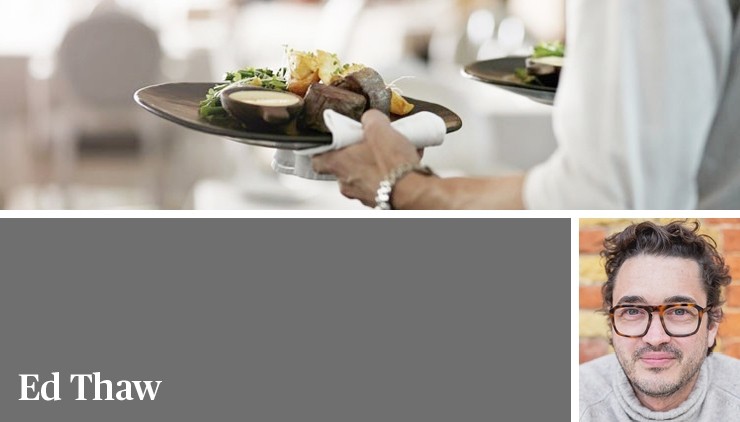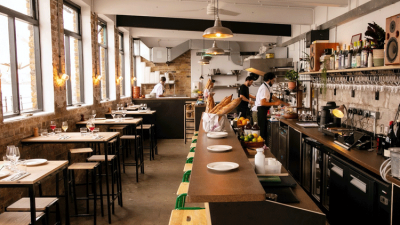Comment
Service included - calling time on tipping

Last July, in the heady days of the first lockdown, my restaurant Leroy followed Hill and Szrok and Oklava in removing the service charge from our bills. We weren’t the first, various hospitality businesses around the country have, at various times, moved away from service charge. What is clear is that, despite restaurants like Brawn and Mana joining us, this initiative has not lead to a flood of places following suit. There are several reasons why. The timing with hospitality on its knees seems wrong. The perceived risks and costs appear too much for many and in every case TRONC is the way that this industry has been doing business. Peter Davies wrote with clarity in this publication about why we should be ‘careful what we wish for’ and that the abolition of service charge will be a ‘costly one way street for operators.’ Here is why I, and others, disagree.
Peter can argue that there are no problems in a well-run TRONC scheme, and as a Troncmaster, he would. The fact remains that the reality for far too many employees in this country is far from acceptable. There’s too much grey, too much scope for abuse and, as I have heard over the last year, too much uncertainty among staff. I’ve received many messages from staff across the country via the @service_included Instagram that suggest that TRONC is not working for staff. Leaving aside that it has meant that many spent the last year in real hardship because of the decision by the Government to exclude it from furlough. The fact is that too many companies were using it for their benefit and they got caught out. If it is a problem for staff then it should be a problem for us as operators. We talk a lot about respect as an Industry. Well TRONC is not a respectful way of remunerating employees. We are not talking about something that can be dealt with by an app like Tipjar. We are talking about moving on from something that businesses have become reliant upon because their model is broken. There is an undeniable cost that must be dealt with but efficiency is but one of the tools at our disposal in business. It is not, and cannot be, the only goal.
Just because something has been does not mean it must continue to be - the Apprenticeship Levy, an initiative that has seen apprenticeships fall not rise, is one example of bad policy that needs to go. Customers don’t care about whether TRONC is good or bad any more than they expect hospitality businesses to practice what they preach. They certainly don’t want it explained before, or after, the snacks arrive. If they knew the reality of how the skilled server making their evening memorable was remunerated I don’t think they would be impressed. One of my previous employees reached out to me on Instagram to tell of how she was made to sign a minimum wage and service contract with zero hours guaranteed at her new job in a swanky hotel. This practice is endemic and will take a real effort to stop. It’s not as if staff have any choice when there are so few alternatives. And while you would expect new business owners to be looking at a different way the evidence is that they are going along with the prevailing assumption that TRONC is a fact of business.
Efficiency is important. But what about sustainability? As a sommelier I spend a lot of my money supporting wineries that follow sustainable agriculture. Working biodynamically is a more expensive way of doing business but one that makes wines that not only, in my professional opinion, taste better but do better for the soil. It’s a far longer-term perspective than that currently exhibited across this industry. Hospitality operators should be aiming for sustainable businesses. Just as there is only so many chemicals you can put into soil before it dies so we have reached, with Brexit, Covid and the bonfire of mid-market chains, the limit of what can be achieved by this, efficiency-led race to the bottom.
Getting rid of TRONC is a way for businesses to reset the conversation with their staff AND be straight with their customers. The story is simple and consistent. Getting rid of the awkwardness of tipping is an obvious first win but the bigger goal is to tell a deeper emotional story of what this business believes in. This is an important Industry, a vital part of the cultural and social life of the nation and by going #serviceincluded we can demonstrate how are doing it right. Staff know where they stand, and get consistent wages rather than wages for the benefit of the business. Danny Meyer could not make it work in the States for a few reasons - legal, cultural and structural. The tipping culture is far more endemic in the US. Imagine tipping a pound a drink to your server in the pub! Every state has different rules. And New York state in one example refused to redirect the service charge away from those who serve customers. Needless to say, as in so many things, we are not the US. There is no state vs. federal government division to be overcome. No desire to excessively reward front of house staff and legal division in this country between those who serve and those who don’t. Indeed, I would argue that #serviceincluded is actually very British. It’s all included, you don’t need to worry about it much less feel embarrassed about getting it wrong. In Japan they are offended if you tip. Being in the middle comes very naturally to us in this country.
Staff should be at the centre of any business and, ignoring the ridiculous assertion by the home secretary that we are unskilled, we have to aim for a future where our staff are higher skilled, better paid and we as an Industry can charge customers more for what an improving product. The benefit of a #serviceincluded mentality flows through the whole supply chain. It’s not about removing the word ‘optional service charge’ from bills, it is far bigger than that. Mr Davies is not arguing that UK hospitality staff are overpaid. He is doubting the desire of the British public to pay for it. But each Independent operator can set the rules of the game for themselves. It might be a stretch for the private equity-backed chain with a site in Brixton with whom I had a discussion last year, but it is something that operators with control should be able to make the case for. Certainly, as the ‘cheapest Michelin star restaurant in the country’ we are betting that we can make it work. I would argue that any business with an excellent product and a loyal following can and should be doing it.
Danny Meyer talks about an ‘enlightened cycle of hospitality’ which has the passion of the owners as the first stage and taking care of the team as second. The customer is further down the chain. They are beneficiaries of all the work that goes before. They are not, nor should they be, the first order of concern. The customer is not right, let alone always, but they are, obviously necessary. You get all the other stages right and the customer comes with you. No business understands this better in the UK than The River Café. Here is a business that has, with uncompromising clarity, made the case for better Ingredients, better paid staff and customers are happy to pay an exceptional price for what they receive. I would argue that a great deal of progress lies for us lesser mortals in the land between where we are now and a plate of pasta for £28. The point is that Ruth Rogers and Rose Gray didn’t take no for an answer and they built it over 30 years. We need that kind of vision for the industry. Talk of a ‘one way street’ is short termist and devoid of any possibility for growth and progress. Businesses are run by visionaries not Troncmasters for a reason.
Really we are talking about an extra 2.5% to replace something at the end of your bill with increased prices across the menu. I’m not saying it’s easy. But I also think if you don’t make a thing out of what you are doing then you will just look expensive. That’s why #serviceincluded appears on the homepage, the reservations page, the menu, the wine list and finally on the bill at Leroy and Royale. It’s something that customers at Leroy have already appreciated and that discussion can be an addition to all of the other great conversations we can have with a customer if they so choose. My staff definitely appreciate that they made it through this last year on 80% not 50% or 40% of their wages. Apart from anything else, that makes me feel better about myself as an owner. The restaurateurs, some very eminent, who had to launch voucher and other schemes for their staff should look at themselves and ask what happens if we are in this mess again? If we don’t want to appear menial, we can’t be menial. Post facto magnanimity or appealing to your customers to sort something that you could have sorted is very far from the prestige we so desperately crave as an Industry.
All of us who are looking for staff at the minute know that there is a massive skills gap. Now is the time to set this Industry up for more than just a rebound. Let’s stop complaining about the same old issues and get on with building something better. If this last year has shown us anything it’s that waiting for the Government to do something is pointless. Forget a Minister for Hospitality. We have it within us define the kind of Industry we want to be a part of. For me that is better paid, more inclusive, more diverse, better skilled, fitter, happier. more productive. Mr Davies talks about being careful about doing away with tax breaks worth £1.1bn a year to a sector that brings in £74bn of gross value added and employs 3.2 million directly. I would say to him that if that is too much of a mountain for this industry that has demonstrated extraordinary resilience this year or for a Government that will be spending £241bn in the year after this April having spent £350bn last tax year sorting out this mess out, then I would suggest he needs to raise his sights higher. We all do. And the time to start is now. Not some time later.
Ed Thaw is director of Ellory Ltd, which owns Michelin-starred restaurant Leroy in London's Shoreditch and rotisserie chicken-focused concept Royale. You can follow #serviceincluded on Instagram using the handle @service_included.
Are you considering scrapping service charge at your restaurant? Get in touch at James.McAllister@wrbm.com





















